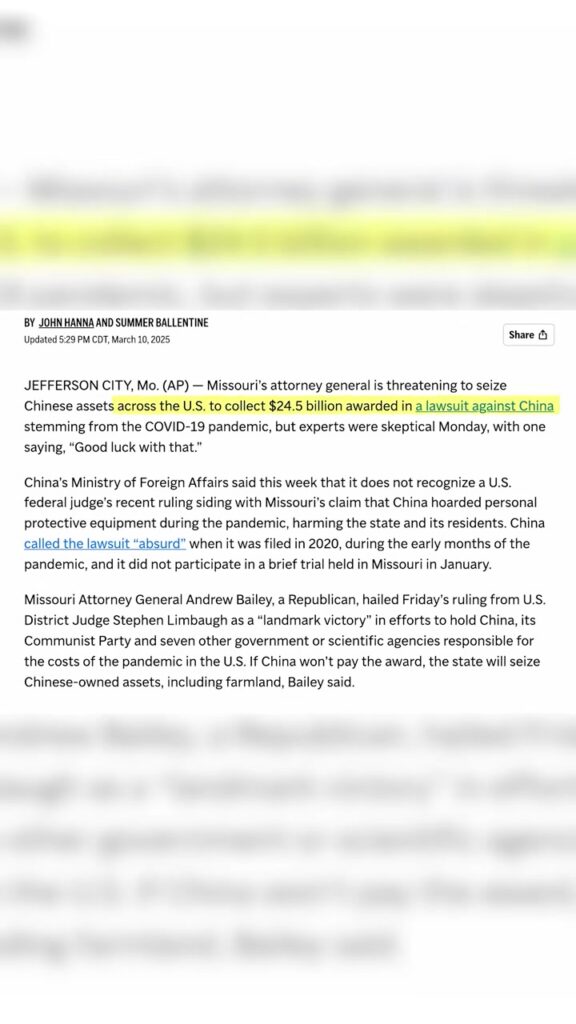Over the past decade, foreign investment in American farmland has become a hot-button issue, with China at the center of the debate. Concerns have mounted over national security, food sovereignty, and rural economic stability as Chinese entities, including state-linked firms, have purchased agricultural land across the United States. As a result, policymakers are now pushing forward new legislation that could, once and for all, put a stop to these acquisitions. But will this finally keep China off U.S. farm ground?
The Background: Rising Foreign Ownership
According to the USDA, foreign ownership of U.S. agricultural land has been steadily rising, with China owning over 350,000 acres as of the latest reports. While Canadian and European investors still hold the majority of foreign-owned farmland, China’s growing stake has sparked alarm due to geopolitical tensions, trade disputes, and espionage fears. The 2021 purchase of land near a U.S. Air Force base in North Dakota by a Chinese company drew national headlines and escalated bipartisan concern.
Legislative Response
In response, several U.S. states and the federal government are considering or have already enacted laws to curb foreign land purchases. Proposed federal legislation, such as the Promoting Agriculture Safeguards and Security (PASS) Act, aims to prohibit certain foreign adversaries—including China, Russia, Iran, and North Korea—from purchasing farmland or agricultural businesses near military bases or critical infrastructure. Similar laws have been passed in states like Texas, Florida, and Arkansas, restricting land ownership by entities tied to foreign governments.
Enforcement Challenges
While new laws are gaining momentum, enforcing them is another matter. Foreign investors can sometimes use shell companies or partnerships with U.S.-based entities to obscure ownership. This makes it difficult for regulators to track and verify who actually owns farmland. Moreover, existing land deals are often grandfathered in, meaning they won’t be undone retroactively.
Another complication lies in balancing economic interests. American farmers and landowners sometimes rely on foreign investment to sell their land or sustain operations. Critics of strict bans argue that painting all foreign buyers with the same brush can hurt the agriculture economy without necessarily improving national security.
National Security at the Forefront
Despite the economic nuances, national security remains the central issue driving current reforms. Officials from the Pentagon to the Department of Agriculture have raised concerns that Chinese land purchases could be used to conduct surveillance or disrupt U.S. food systems. The fear is that land near military installations could be leveraged for espionage or sabotage.
In some cases, state-level legislation has specifically targeted land near sensitive locations. Arkansas, for example, ordered the sale of farmland owned by a Chinese company located near a military base. These actions send a clear message: land near strategic infrastructure is no longer fair game for foreign adversaries.
Will It Be Enough?
The latest legislative efforts mark the most serious attempt yet to prevent foreign adversaries from owning U.S. agricultural land. With bipartisan support and growing public concern, there’s a strong chance that these measures will gain traction. However, their effectiveness will depend on robust enforcement, coordination between federal and state governments, and increased transparency in land transactions.
In short, this could finally be the turning point—but only if loopholes are closed and oversight is strengthened. Otherwise, foreign actors may still find ways to gain a foothold on U.S. soil through indirect ownership or lax state laws.
Conclusion
Will this finally keep China off U.S. farm ground? Perhaps. The political will is stronger than ever, and new legislation is being crafted with sharper focus. Still, vigilance, cooperation, and transparency will be essential to make these efforts stick. The future of American farmland—and national security—may well depend on it.















